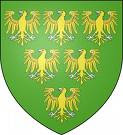Meanwhile, Aymer de Valence, Earl of Pembroke, was in a state of panic. He'd sworn an oath to protect Piers, with his lands forfeit if he failed to do so. His first action was to appeal to Edward II's cousin Gilbert de Clare, Earl of Gloucester, and Piers' brother-in-law. I am still shocked at Gloucester's callous reply. 'My lord earl, the wrong done to you is not to be imputed to Earl Guy. He did this with our aid and counsel; and if, as you say, you have pledged your lands, you have lost them anyhow. It only remains to advise you to learn another time to negotiate more cautiously'. Pembroke was as concerned about his lands as he was Piers. Why Gloucester abandoned Piers is not known - but perhaps he was jealous of the honours and access to the king Piers had.
According to the chronicle of Trokelowe, Lancaster warned 'while he lives there will be no safe peace in the realm of England, as many proofs have hitherto shown us'. Lancaster and Warwick dominated proceedings. Piers' 'trial' was a farce - he was not even allowed to speak in his defence, and no doubt the verdict was already reached. The canon of Bridlington claims two royal justices, William Inge and Henry Spigurnel, were called in to examine the evidence and pronounced Piers guilty. Yet Kathryn Warner points out that Edward II took no action against them. No doubt they were pressured into a 'verdict'. The nobles seem to be more concerned that they would suffer no repercussions, with Lancaster and Warwick promising Hereford they would support him against any losses he incurred. No doubt many deals were committed to parchment and seals attached. What a shame they don't survive. Everything was agreed - Piers was to die on June 19th.
Piers was taken out of Warwick by Lancaster and some of his followers. Guy of Warwick stayed in his castle. I have to wonder why he did not accompany Piers on his journey to Blacklow Hill. Surely witnessing the destruction of his hated enemy would be a chance not to be missed? Or did his conscience trouble him? Not for the death of Piers - but the cowardly manner of it. It was not an execution - it was murder. Warwick seems to have insisted that Piers' 'execution' take place away from his lands - Blacklow Hill was on Lancaster's lands. And yet, even Lancaster's resolve seems to have been shaken. It was agreed that Piers would suffer a 'noble' death - beheading, out of respect of his kinship to Gloucester. But Lancaster chose not to witness it himself and handed Piers over to 2 of his Welsh soldiers, who took Piers out of sight of Lancaster. One soldier ran him through with his sword, and the other cut off his head. Not exactly a 'noble' death. Lancaster only required to see the head to make sure, and Piers body and head were abandoned. Neither Warwick or Lancaster wanted to take responsibility for Piers' remains. Where was their bravado and courage now? No doubt Warwick trembled in his castle, whilst Lancaster waited for the rage of Edward II.
Below - the wood surrounding Blacklow Hill.
 |
| The monument at Blacklow Hill where Piers Gaveston was killed. |
Sources:




3 comments:
The behaviour of Piers' enemies, who chose to stay away rather than witness his execution/murder gives us much food for thought indeed, I agree. What do you think made them do so? Was it really only the manner of his death that gave them a few sharp pangs of conscience? Or was there more to this? Perhaps they thought Edward's rage would be even greater if he was to learn who was present at Blacklow Hill or who wasn't? Does it make sense? Just speculating.
Do we know what happened next to Piers' remains? Who took care of the poor body and head? I can't believe the executioners left it on the spot.
Such a sad anniversary :/ I do wonder about the earl of Arundel, as he wasn't one of the men pardoned for Piers' death, and grew very close to Edward in later years - would Edward really have forgiven him if he'd really been there? It's all a bit curious.
Tomorrow...:(
Kasia - it's something that has puzzled me as well. Guy showed no concern to how he treated Piers, humiliating him, keeping him in chains, and there was no doubt about his intentions to kill Piers. So why not enjoy his 'execution'? Look at Isa when she executed Despencer - putting up a huge scaffold, and eating as she watched Hugh torn apart. Guy wouldn't even allow it on his land, and refused to admit the body afterwards. Maybe by being absent, Guy was hoping to escape the full wrath of the king? Lancaster went so far and stopped short of watching. Were they both hoping to avoid total blame? Or just maybe they realised how shoddy their behaviour was and they were actually committing cold-blooded murder?
Piers' remains were found by some shoemakers who took it to Warwick castle, where a horrified Guy refused to admit it. They apparently re-attached the head! They then took the remains back to Blacklow Hill and left them there. Eventually, some Dominican friars got hold of the body, took it to Oxford where they washed and tended to it, until Edward recovered the body. The whole story deserves a post of its own!
Kathryn - if only we had 'minutes' of what took place at Warwick Castle.
Post a Comment